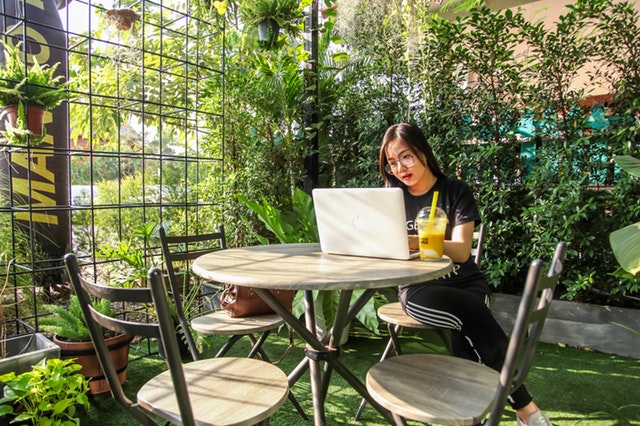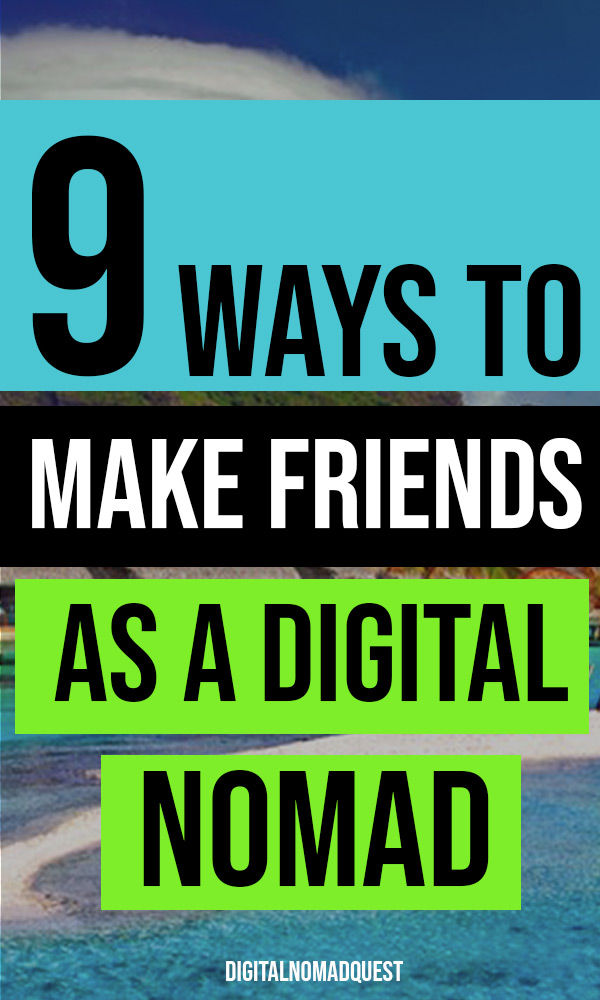In this post we’re going to talk about 9 ways to make friends as a digital nomad! It can be intimidating to be in a new place by yourself, particularly if you happen to lean towards being more introverted. Even if you can go longer periods of time without having social interactions, at some point you’ll likely start to feel lonely and in need of companionship. Thankfully, there are many people who are in a similar situation as solo travellers.
Making connections with other solo travellers is a good way to learn from people going through the same experiences, but connecting with locals is also important if you plan to stay for a chunk of time or come back. Solo travellers can also end up being a good launching point in a new place if you visit them in their home country. Either way, these friends can have your back when you need help, wherever you are in the world.
9 Ways to Make Friends as a Digital Nomad
1. Your existing network
A great place to start is your existing network of friends and family. Think about the people you know who live in different countries and consider connecting with them before your departure or while you’re in the area. Even the friends and family that don’t live abroad likely have friends or family of their own that live abroad that they’d be happy to connect you with. Perhaps a friend of yours moved to the UK or a cousin did an exchange program in France and still has connections there.
If you let people know of your plans to go abroad, you’re bound to have loved ones tell you about the people that they know in those countries who could be a great support to you. Don’t shy away from contacting those folks when you’re there just because you don’t know them, people are usually quite happy to share local knowledge and at least host an out-of-town guest for a meal.
2. Facebook
Social media is an exceptional tool that has made our world seem quite small sometimes. In an instant, you can be in touch with someone on the other side of the world. This is a handy way to connect with friends and family (or their friends and family) abroad, as above, but there are also specific Facebook groups for solo travelers and digital nomads to connect. These are great resources to connect with other nomads in the countries you plan to visit (or perhaps even steer you in the direction of which countries to visit) as well as a wealth of information and tips. Simply do a search on Facebook of ‘digital nomads’ and many types of groups will come up. You can even narrow your search by including the city you plan to visit, find female-specific groups, groups for singles, groups for teachers or entrepreneurs, and many more. Here are some great examples:
- Check out our group – Passive Income Online Business Entrepreneurs
- Female Digital Nomads
- Digital Nomad Entrepreneurs
- Digital Nomads Around the World
- Global Digital Nomad Network

3. Events and Conferences
If you prefer to network in a face-to-face situation, then events and conferences are an excellent way to do that. Finding events or conferences for digital nomads may seem like a long shot, but they can be quite common. Events can be found on sites like Meetup.com, EventBrite.ca, or even on Facebook through the events page. These events are commonly specific to the destination you plan to travel to. Conferences, on the other hand, are a great way to meet nomads from all over instead of just your destination. Some of the most popular nomad conferences include:
- Nomad City
Hosted annually in Gran Canaria, this conference is typically a few days to a week in length and brings together digital nomads from all over the world. Sessions focus on entrepreneurship, remote working tips and tricks, and distributed companies. - Nomad Summit
Another multi-day conference, the Nomad Summit includes lectures from successful digital nomads, networking opportunities, and social events. - 7in7
This conference gets its name from the team’s goal to hold 7 conferences on 7 continents in 7 years. The women-based initiative will be hosting its fourth conference in 2019 and keeps the guest list quite small to keep workshops intimate. Only around 100 spots are available to participants. - Freedom x Fest
A new event on the scene in the form of a festival as opposed to calling itself a conference. However, there are plenty of opportunities to engage in workshops and listen to successful speakers. This is a well-attended festival with over 1000 people attending the inaugural festival in 2018. - Running Remote
Held in a different location each year, this conference predominantly highlights tech companies and startups with remote workers. A variety of workshops related to running a business as well as keynote speeches from successful entrepreneurs are scheduled amongst networking and social opportunities. - Nomad Train
This is more of a networking opportunity than a conference. There are no formal sessions, but you will get to meet other nomads as you travel on the Trans-Siberian train between Russia and Mongolia. Participants also have the opportunity to check out stopovers along the way, including popular coworking spaces.

4. Coworking Spaces
Given that digital nomads don’t exactly have a formal office space, they often end up finding other spaces to work in. Cafes are a great option with internet access, food, and a source of caffeine be it coffee or tea! Make a few visits to your favourite spot and you’ll begin to notice who the regulars are. Offer to buy their drink for them or go over to strike up a conversation about other hot spots in the area or what they’re working on. Remember, most other remote workers are in a similar position without many friends or connections in the places that they visit, so they are likely to be grateful for the conversation and a little break from their work.
Coworking spaces are an even better place to meet other folks who work remotely. A coworking space is a shared office space that you pay some sort of rent for, whether it be a daily pass or a monthly plan. A daily pass is a great way to check out the scene and see who else is using the shared space, without a long term commitment if you don’t end up vibing with the other people there. A monthly pass allows you to get to know the other regulars and suggest grabbing a meal together or checking out some of the local attractions when you decide to call it a day.
5. Accommodations
Digital nomads have numerous options when it comes to finding a place to live. While you could opt to find private living arrangements, there are many shared accommodation options that offer unique ways to connect with other travellers and remote workers.
Coliving spaces often provide the option of a private or shared bedroom space with shared facilities such as a kitchen, living space, and bathrooms. Coliving spaces are also often geared specifically towards remote workers and thus have built-in office spaces for occupants to share as well. These are a newer concept, but are much like the age-old roommate setup that you may have experienced in college. Though likely more professional and with shorter term commitments than signing a lease. This setup is an ideal opportunity to get to know other digital nomads and explore the area together.
Hostels are a less ideal living accommodation for remote workers given the more dorm-like party atmosphere they often entail. However, they are still a great way to meet other travellers and some have better standards than others. Some have the option of a private room, which can help you get enough rest without roommates coming back in the early morning hours. Even if you decide not to stay at a hostel, you can often find a bar or restaurant within a hostel that is open to the public where you can meet people. Alternatively, hit up the food and drink spots that surround the hostel during the day and you’re bound to bump into some new friends.
Airbnb is another popular option for finding accommodations due to the affordability and flexibility – you can find a place to rent for the night, a week, a month, and sometimes even longer. You can also filter your searches on Airbnb to either rent a room in a shared house or a private home all to yourself. Each has its advantages; a shared space allows you to directly meet other people or the host if they also live in the home while the host of a private home is still often eager to tell you about all the best local spots.
6. Tours and Excursions
There are plenty of opportunities for tours and local experiences that are organized by local attractions and agencies. Hit up a museum or art gallery and sign up for a guided tour where you can connect with other tour participants. Or find other excursions and day tours through Airbnb’s Experiences, local tourism agencies, and local travel agents. Even if the folks you meet aren’t remote workers, they might be good company for a few days and perhaps you’ll even make friends that live in a country you plan to visit down the line.
7. Learning Opportunities
All work and no play makes Jack a dull boy. Just because you’re living the digital nomad lifestyle doesn’t mean you can’t take the opportunity to sign up for courses and learn new skills. Though most of these opportunities aren’t the kind of learning you think. Find cooking classes where you can learn to recreate your favourite local dishes. Get your scuba diving certification while you’re living in a coastal area, or learn to surf or snorkel. Sign up for fitness classes such as yoga, dance, or group workouts. Any of these courses will provide plenty of opportunity to strike up conversation with other participants and can lead to going for a meal or drinks afterwards.
Language classes are another common learning opportunity while living abroad. This is an especially handy way to learn the local language if you plan to stay for a longer period of time or tend to travel to countries where that language is spoken as a first or second language. Typically you won’t find typical tourists in a language course, nor would locals need to attend, thus you end up in a class of expats or other folks who are living abroad.
8. Online Communities
Similar to Facebook, but independent of social media, there are communities online where digital nomads and expats go to connect. These communities, such as Nomad List, offer advice and tips, but more importantly provide a forum for people to connect with each other. It is easier to find a specific forum for the city you are in or will be in soon, so that you can chat with other users who are currently there or who are also travelling there. Some websites, such as Internations, also arrange group meetups that anyone who plans to live abroad can participate in. The drawback to these communities over Facebook groups are that they require a membership fee in order to subscribe and be able to chat with other members.

9. Nomad Programs
Some companies offer the opportunity for digital nomads to travel together as a group while pursuing remote work opportunities. This may not be convenient for someone who wants the freedom to travel on a whim, but may offer a taste of what the opportunity can look like while having the companionship of a group to travel with. The most common example is Remote Year, which organizes groups of remote workers for varying durations up to one year with travel to a new place every four weeks.
Wherever You Go, There You Are
Don’t worry about travelling alone as a digital nomad, there are plenty of opportunities to meet other people. Even the most introverted and shy folks will be able to find a way to connect with others along the way using one of the methods described above. You are not the first solo traveller and you won’t be the last, there will be many other people along the way who will also be looking for friendship. Friendships abroad not only serve as companionship on your journey, but also offer connections in numerous other places that you may end up visiting.
Hope you enjoyed this post on 9 ways to make friends as a digital nomad, and let us know in the comments if you have other suggestions!


